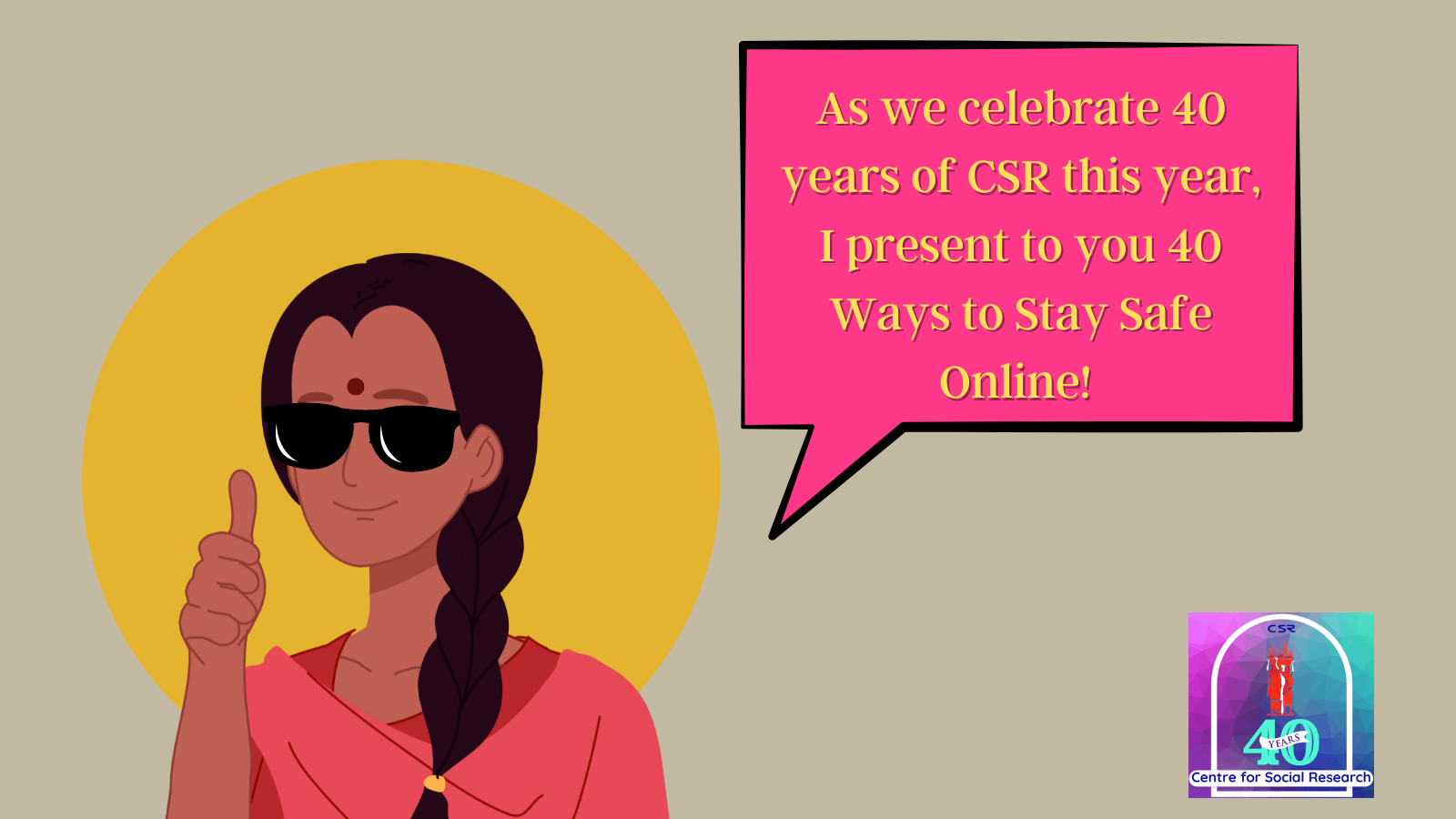CSR@40
As a woman, it is crucial to ensure your safety while browsing the internet, with the increasing number of cyber threats, it is essential to be aware of the dangers and take necessary precautions to protect your online presence.
With the advancement in technology, cyber offenses and the victimisation and objectification of women are increasing and it poses a great threat to the security and mental health of the individual.
Here are 40 ways to be safe online as a woman:
- Use strong passwords that include capital letters (QWERTY ), series of numbers (0-9), and symbols(#@), a letters-only password can be brute-forced instantly by hackers
- Enable two-factor authentication for your accounts so that even if your password is hacked the intruder can’t access your account without the approval of the second factor
- Do not share your passwords or OTP with anyone
- Do not use the same password for multiple accounts as it can leave you and your information vulnerable to financial and identity theft
- Don’t write your passwords on a piece of paper, instead use a password manager to securely store your passwords.
- Always use a secure browser like Google Chrome or Mozilla Firefox which can help prevent unauthorized third-party activity while you’re surfing the web
- Clear your browsing history and cache regularly
- Check the URL before entering any sensitive information
- Be cautious while clicking on a pop-up, use ad-blockers to avoid malicious ads like U-block origin browser extension
- Be careful while using online banking and shopping websites
- Do not use auto-fill for sensitive information, hackers can add an invisible auto-fill form on a website and get access to your information
- Use a reputable antivirus software and keep it updated, this will ensure that viruses are blocked before they can infect your computer and always keep a backup of your important files
- Keep your software and operating system up-to-date, new software update includes patches that can prevent hackers from using known vulnerabilities
- Use a firewall to protect your computer from unauthorized access.
- Use a VPN or Virtual Private Network to protect your online privacy it helps in masking your device’s IP address and prevent you from getting tracked
- Do not use pirated software as you can expose yourself to malware, ransomware, trojans, and viruses
- Try keeping your laptop camera covered when not being used
- Be cautious while accepting friend requests on social media platforms
- Be careful while posting photos online, Do not share sensitive information on social media platforms
- Keep your accounts private, use privacy settings on social media platforms this will give your information only to the people you want
- Use encrypted messaging apps like WhatsApp or Signal
- Check app permissions and remove all permissions that are not necessary
- Be wary of getting official calls from unusual numbers
- Use a called id like Truecaller to identify scam calls
- Do not fall for too good to be true deals on the internet, such as messages saying you won the lottery even though you never registered for any lottery
- Use a reputable email provider, like Gmail, Hotmail or Icloud
- Do not give out your email ID on unnecessary platforms
- Do not open suspicious emails or messages, Be wary of phishing scams
- Avoid using public computers for sensitive tasks, when using a public computer always logout of all accounts or use incognito mode
- Avoid using public Wi-Fi networks, due to lack of security wifi connection may be compromised by a hacker, allowing them to inject your device with viruses and malware
- Be careful while using public charging stations, hackers can use this to get access to your phone, also known as ‘Juice Jacking’.
- You can check if your email address or phone number has been compromised by using websites like haveibeenpwned.com or avast.com/hack-check
- Learn about the tools available that can help you, CSR India has curated a toolkit to educate and empower internet users about the threats lurking online, and the availability of various tools that can be used to not fall prey to online abusers, trolls or scammers, and safeguard from cyberbullying and online harassment https://www.csrindia.org/online-safety-and-security-toolkit/
- Be aware of your rights as a netizen and the laws available to protect you
- If you encounter a cyberbully or someone you know is being bullied online, take screenshots and report their account
- You can visit https://cybercrime.gov.in to register your complaint and know more about cybercrime
- Contact a women’s assistance cell or NGO which can assist and guide you through the process and make sure that police do not take any case lightly
- If you fear someone might leak your intimate photos, You can register a complaint on ncii-complaint@csrindia.org or visit https://stopncii.org/
How does StopNCII.org work?
- Select the intimate image(s)/video(s)
- For each piece of content, StopNCII.org will generate a digital fingerprint, called a ‘hash’ on your device. Only the hash is sent to StopNCII.org, the associated image or video remains on your device and is not uploaded.
- If your case is created successfully, you will receive a case number to check your case status – remember to make a note of your case number along with the PIN, to access your case after it is submitted. This is not recoverable.
- Participating companies will look for matches to the hash and remove any matches within their system(s) if it violates their intimate image abuse policy.
- You can use your case number anytime to check the progress on your case, or if you wish to withdraw your participation.
- You can also file a complaint on ‘complaint-mwcd@gov.in’, which is a dedicated email address for women and children to file complaints about abusive behavior, harassment and hateful conduct on social media
- Be vigilant and stay informed about the latest cyber threats.
Stay Safe!





